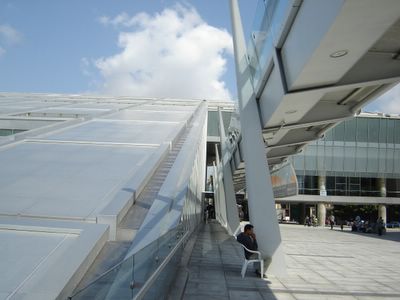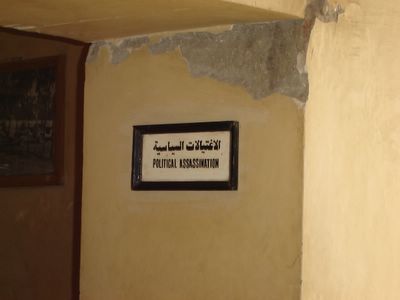UNESCO's pride in tainted antiquity

I lost all my pictures from Cairo to Alex. I don't know how. I uploaded them, deleted them from my camera during the process as I always do, and they weren't there. I began taking test photos, and it works fine now. And I should mention internet is pricey (my own relative cost standards are skewed in this country. I don't know I can ever pay for a three dollar coffee again) so, posts tomorrow until 8:30 my time, then the next day, after 5pm.
Get into Ramses Station around 6:45. Ramses is a short drive from the dormitories, and mornings such as this are blissfully calm as a thick fog struggles to rise from the Nile and the city it blankets. The sky is gray, overcast, as it always is this time of day. Somber, but not gloomy. Anyhow, I arrive at Ramses. I give the driver 10 LE, probably more than I should, but he whisked me through the chaotic bustle outside the station and he didn't offer a marriage proposal. The station is a surprisingly well coordinated affair, by Egyptian standards. If you squint your eyes (real hard), you could pretend you were in Waterloo or Gare du Nord. I appear to know what I am doing, albeit the only white girl in the station, I am not approached by tourist police, and my command of Arabic is sufficient in reading the timetable board, which is ONLY in Arabic. Speaking of my Arabic, I would say it's pretty damn good these days. We've covered all tenses of the Arabic language, hundreds, if not thousands of vocabulary words, and my grammar structure become more complex daily. Anyhow, train departs at 8am, the receptionist at the dorm said boarding at half past seven would be adequate.
I slip into a gawah where I take a seat at a table beside a window looking onto the platforms. The waiter comes by, I order a coffee, in Arabic, he cheerily blurts, "Nescafe!" To which I reply, "No, something stronger, like, um, Turkish coffee" (in Arabic). He nods and dutifully returns with this and a bottled water, which, I accepted despite the 2 LE charge. If Turkish coffee sparked heart attacks, this Turkish coffee would have prepared me for a triple bypass. It was so strong, so thick, not too sweet, but so out of this world. It would wake someone out of a coma (who's up for instituting "Turkish coffee mornings at HHS?"). I've taken to the occasional Turkish coffee here where I can find it, it's a special treat not purely for the sake of its consumption but for the concomitant experience. So, I sit back, gaze across the station which is gradually revving, with flocks of Sudanese families, young children and elderly women. Now that my heart is pounding, I hitch up my backpack and laptop bag and head for the train.
Platform 3. Turbochine bound for Alexandria. Car 5. Seat 56. Sounds easier than it is. The train cars are mysteriously out of order. But I find my way, to a nice seat, yet right before a bulkhead at the front of the car with a highly obstructed window view due to a broken shade. You know that lurching feeling in your stomach you get walking down the aisle of a train or a plane when you keep quickly glancing from your ticket to the seat you don't want? That was the situation. And that's obviously the seat you get. But, I was happy to be aboard for the two hour journey. The ride ran perpendicular to Nile, passing verdant fields with donkeys, goats and older men hunched harvesting something. And miles and miles of dilapidated villages, malnourished children waving at the train, cars smashed into trees along the motorway abandoned. Interesting. And boom, you're in Alexandria.
Michael Palin called Alexandria "Cannes with acne." I would perhaps say "18th century Marseilles with severe small pox." At any rate, the saline saturated breeze and gorgeous azure coast is wonderful. The yellow and black Fiat taxi bombed down the Corniche. It was stunning.
The hotel has TV5. I think I could just sprawl before the bed and watch that all day long. Bask in neither Arabic nor English (guilt inducing), but French. And the hotel is spectacular, FYI, if you come to Alexandria, Renaissance Hotel Alexandria is where it's at.
And, a private beach, and rooftop pool, sauna, steamroom, awesome gym. I went to the beach immediately, and beneath a big yellow umbrella, on a lounge chair, with books and iPod, big fluffy towels, I settled for the afternoon. It was SO nice. Attire is everything. Being on a private strip of beach, there were two other guys, on a huge parcel of sand, between hoards of people blocked by fences and guards. Kind of weird. But all the women were completed clothed. Swimming. I could have hopped in with the two-piece, later guests did, but I went with the two-piece and a fitted tee shirt. Seemed sufficient. Modesty and respect for them. But, it was wonderful.
Then I went to the Bibliotecha Alexandrina. It was a massive, and I don't want to use the word monstrosity, but, a "striking" new monument on the shoreline that is a revival of the ancient library, sponsored by the United Nations, costing them millions, if not into the billions of dollars. It's ridiculous. The architecture, eh, interesting, out of the ordinary for Egypt, but I have seen it before. The green glazed glass shooting into the sky brimmed by stainless steel supports and bright white detail. Security was very tight. Most of the visitors were actually young Muslim women, some around my age, which was nice to see. Inside the library, it's kind of just a library. Lots of hype.
Following this I went out to Carrefour, the market, not realizing it was on the Cairo Alex Desert Road, or on the outskirts of the city. Whoa. It's like a BJ's and a Wal-Mart with some class, and within a sizable mall. Complete with "Mr and Mrs Smith" playing at the theatre, video game stores, Niketown, too much to see. Very interesting though. Sadly, maybe more interesting than the library.



























